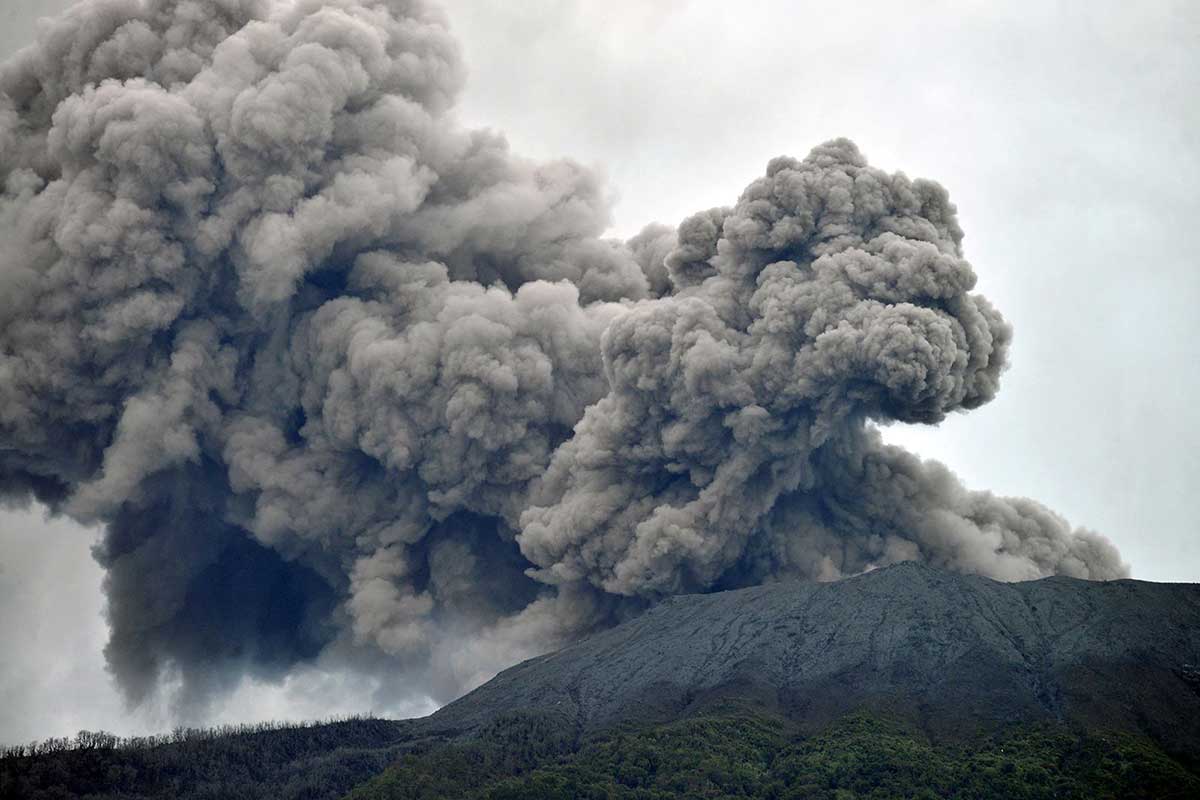Bali, Indonesia – A powerful volcanic eruption from Mount Lewotobi Laki-Laki in Indonesia led to the cancellation of multiple international and domestic flights from Bali, leaving hundreds of tourists stranded. The eruption, which occurred on the night of March 20, sent massive ash clouds soaring over 8 kilometers into the sky, forcing authorities to declare a 14-day emergency in the region.
Massive Ash Clouds Blanket Villages
The eruption, lasting more than 11 minutes, resulted in volcanic ash blanketing several villages in the region. Residents and travelers witnessed thick plumes of smoke and ash covering homes, roads, and farmland, causing severe air quality concerns. Officials urged locals to wear protective masks and stay indoors to avoid inhaling the fine ash particles, which can pose serious health risks.
In response, Indonesian authorities quickly mobilized emergency teams to evacuate thousands of residents from high-risk zones near the volcano. Temporary shelters were set up to accommodate the displaced population as experts continued to monitor seismic activity for any potential aftershocks or further eruptions.
Flights Disrupted Amidst Safety Concerns
The volcanic ash cloud significantly impacted air travel, leading to the cancellation of multiple flights. Jetstar Airways, an Australian carrier, cancelled six flights scheduled to depart from Ngurah Rai International Airport in Bali to Australia. Additionally, AirAsia cancelled a flight to Kuala Lumpur, affecting passengers traveling between Indonesia and Malaysia. Several domestic flights also faced disruptions, although services gradually resumed by the evening once conditions improved.
Travelers expressed their frustration as many found themselves stranded at the airport, unsure when they would be able to depart. Airlines advised passengers to stay updated with flight status notifications and offered rebooking options.
Government Declares 14-Day Emergency
With the scale of the eruption and its impact on local communities, the Indonesian government declared a 14-day state of emergency. Authorities are actively coordinating rescue operations, ensuring the safety of affected residents, and assessing the long-term damage caused by the eruption.
Indonesia’s National Disaster Mitigation Agency (BNPB) warned that further eruptions could occur and advised people to stay alert. The government also provided guidelines for tourists and travelers on how to handle cancellations, reschedule flights, and prioritize safety during this period.
Bali Tourism Faces a Temporary Setback
Bali, a global tourist hotspot known for its beautiful beaches, vibrant nightlife, and cultural heritage, heavily relies on international travel. The sudden eruption has caused temporary disruptions in tourism, with visitors reconsidering travel plans due to safety concerns. Hotels and resorts near the affected areas are making arrangements to accommodate guests who may face delays.
Despite the current setbacks, experts believe that Bali’s tourism industry will bounce back once air travel normalizes and the volcanic activity subsides. Many travel agencies and airlines are working closely with authorities to minimize inconvenience and ensure a safe return to operations.
Indonesia’s Volcanic Activity and the Pacific ‘Ring of Fire’
Indonesia is home to nearly 130 active volcanoes, making it one of the most seismically active regions in the world. The country sits on the Pacific ‘Ring of Fire’, a zone known for its frequent earthquakes and volcanic eruptions due to the movement of tectonic plates.
Historical records show that Mount Lewotobi Laki-Laki has experienced multiple eruptions in the past, but the current event is one of the most significant eruptions in recent years. Scientists and geologists are closely monitoring the volcano’s activity to predict any future eruptions and mitigate potential risks.
Safety Measures for Residents and Travelers
Authorities have advised both locals and tourists to adhere to the following safety measures:
- Stay informed about flight status and travel advisories issued by airlines and government agencies.
- Wear protective masks to avoid inhaling harmful volcanic ash.
- Avoid areas within the designated danger zone around Mount Lewotobi.
- Follow official evacuation orders and relocate to safe zones if necessary.
- Travelers should check with airlines for rebooking policies and alternative flight arrangements.
What’s Next?
The Indonesian government, in collaboration with international agencies, continues to monitor the situation closely. Emergency relief efforts are underway to provide food, medical aid, and shelter to affected residents. Geologists remain on high alert, tracking any further seismic activity that could lead to additional eruptions.
Meanwhile, airlines are gradually resuming flights as weather conditions improve, and volcanic ash disperses. Travelers are encouraged to stay updated through official sources and make informed decisions about their plans.
Final Thoughts
While Mount Lewotobi Laki-Laki’s eruption has caused significant disruptions, both authorities and businesses are actively working towards normalizing the situation. With proper safety measures and continuous monitoring, it is expected that travel to and from Bali will soon return to normal, ensuring minimal long-term impact on Indonesia’s thriving tourism industry.
YAllA TV – www.yallatv.ae





